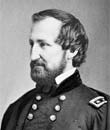
Day-by-Day Timeline of Events
June 3, 1861
In the war's first contact battle between the two sides, Union forces claim the victory over Confederate elements at Philippi in West Virginia. The retreat of the Confederates, under General Robert Garnett, is so fast the engagement is known as the "Philippi Races".
June 4, 1861
Suffering defeat in the first true land battle of the war, Confederate forces clear out of Philippi, West Virginia.
June 11, 1861
Union loyalists in Western Virginia arrange their own local government. The work lasts through June 19th.
June 14, 1861
Acting governor of Virginia, John Letcher, calls on West Virginians to join the Confederate cause.
July 11, 1861
Union forces are victorious over Condeferate elements at Rich Mountain in West Virginia.
July 13, 1861
In Carrick's Ford (West Virginia), Confederate General Robert Garnett becomes the first officer-level casualty of the war.
September 10, 1861

September 11, 1861
Confederate General Robert E. Lee attempts to take Union positions at Cheat Mountain in West Virginia. This marks Lee's first major foray in the war.
February 13, 1862
West Virginia authorities pass a law that restricts slaves and people of color from being given permanent residency.
May 12, 1862
Having chased Union forces off north of Franklin (West Virginia), Stonewall Jackson turns back towards the Shenandoah Valley.
September 9, 1862
Special Orders 191 is given by General Lee, ordering a special column formation to be taken by his troops to increase the chances of overtaking Harpers Ferry and the Union forces garrisoned there.
September 11, 1862
General Lee assigns General Longstreet to guard the approaches from the north while General Hill is given the task of the defending the approaches from the south of Harpers Ferry.
September 11, 1862
General Jackson engages Union forces at Martinsburg and drives them back towards Harpers Ferry.
September 12, 1862
The Battle of Harpers Ferry begins. Generals Miles and White lead a Union force of 14,000 against some 26,000 Confederate attackers under the command of generals Stonewall Jackson and A.P. Hill.
September 15, 1862
General Jackson's forces open up with artillery strikes against Union forces at Harpers Ferry.
September 16, 1862
Having suffered a mortal wound at the Battle of Harpers Ferry, General Dixon Miles dies.
June 22, 1863
West Virginia, a breakaway territory of Virginia proper, becomes the 35th state in the Union.
June 30, 1863
West Virginia officially becomes a supporter of the Union cause in the Civil War and commits its resources to the conflict
August 26, 1863
Union and Confederate cavalry elements meet one another at Rocky Gap outside of White Sulphur Springs in West Virginia. The clashes last until the 27th.
May 10, 1864
Confederate forces, numbering 4,000, at Crockett's Cove, Virginia, stand their ground against a Union charge of 2,500 strong. The attackers are driven back into West Virginia. Confederate General William E. Jones claims the victory over Union General William Averell. The official battle results are listed as inconclusive.
August 7, 1864
The Battle of Moorefield takes place in Hardy County, West Virginia. It is a Union victory for General William Averell over Confederate leader John McCausland. Union strength is 1,760 against 3,000 Confederates. Casualties are 42 against 488, respectively.
August 21, 1864
The Battle of Summit Point, also known under the names of Flowing Springs and Cameron's Depot, takes place in Summit Point, West Virginia. It is an inconclusive engagement involving Union General Sheridan and Confederate Generals Anderson and Early.
August 25, 1864
The Battle of Smithfield Crossing is another inconclusive engagement between the two sides in West Virginia. The fighting spans August 25th into August 29th.

